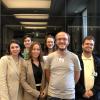News
Displaying Results 26 - 50 of 132
The Norwegian Government has issued a Mineral Strategy which necessitates the Geological Survey of Norway to produce an inventory aligned with the United Nations Framework Classification for Resources (UNFC).
UNFC will be crucial in this strategy as it will be used to classify mineral resources…
Since September 2022, as part of “The Sustainability Pledge” initiative, UNECE has been working with fashion company Stella McCartney and its Cotton supplier SÖKTAS to trace a T-shirt made of jersey fabric through documentary evidence.
The UNECE blockchain platform allows to capture all actors…
While underground coal mining in Albania stopped almost wholly (except for two private mines with a very insignificant output) more than 15 years ago, the abandonment of the mines from the 1990s onwards with no proper plans for closure has left a legacy of risks. These include water contamination,…
As the global economy emerges from the COVID-19 pandemic and governments strengthen efforts to “build-back-better”, trade as an engine of growth has re-emerged in policy agendas. For developing countries and countries with economies in transition that are still in the process of accession to the…
For many people around the world, the work and achievements of the United Nations remain in the realms of grand summits of heads of state on pressing global issues, of diplomatic brokering of peace agreements, of urgent humanitarian interventions for people in the greatest need, and other high-…
Momentum is growing on the digitalization of the Middle Corridor, linking the European Union and Asia, through Central Asia, the Caucasus, Türkiye and Eastern Europe, through the use of UNECE and UN/CEFACT standards for digitalization of multimodal data and document exchange.
Representatives of…
The world is facing multiple global crises and the 2030 deadline for achieving the Sustainable Development Goals (SDGs) is fast approaching. More and faster investment in sustainable infrastructure that supports the 2030 Agenda for Sustainable Development is therefore needed. Public-Private…
Young people across the Pan-European region are driving change for a sustainable future and will be key actors to get countries on track for the implementation of the 2030 Agenda. Their role is also integral to the huge potential of education to build knowledge, skills and understanding to tackle…
In the world grappling with the triple crisis, encompassing the COVID-19 pandemic, ongoing regional conflicts, and climate change, disruptions of global supply chains are becoming more evident, resulting in the global trade slowdown. More specifically, these challenges have led to a significant…
In 2021, Chile was the world’s fourth largest importer of second-hand and unsold clothes, and the first in Latin America. Imports reached some 126,000 million tons, originating principally from China, the United States and the Republic of Korea.
About 40% of these clothes are imported through…
Representatives from Kazakhstan, Kyrgyzstan, Tajikistan, and Uzbekistan met at the United Nations Economic Commission for Europe (UNECE) to discuss ways to unlock the resource potential and promote a sustainable future in Central Asia. The meeting was part of the UNECE Resource Management Week 2023…
Originally published as a guest article by IISD’s SDG Knowledge Hub.
How can we rescue the vision of the 2030 Agenda for Sustainable Development and get in shape for Our Common Agenda for 2050? Part of the way forward is without doubt to embrace the digital and green transitions.
As we heard…
Halfway to 2030, the future we want seems to be still well out of reach. The 2023 SDG progress report for the UNECE Region, which informed discussions at the inclusive and 1000-strong Regional Forum on Sustainable Development held last week, showed that despite some bright spots, we face a troubled…
Innovation and Technology, which is the focus of this year’s International Women’s Day, presents powerful opportunities for gender equality, and offers welcome hope at a time of great challenges for women’s empowerment. In fact, the regional progress report on the Sustainable Development Goals (…
While companies and stakeholders across industries will not tire to make promises that include their willingness to become more transparent, we still see little actual progress. Research by Deloitte has shown that 65% of procurement leaders across sectors have limited or no visibility beyond their…
Inland transport plays a crucial role in the global economy, connecting people, goods and services to markets and opportunities. However, the rapid growth in this sector has had a significant impact on the environment. The increasing demand for faster and more efficient modes of transport has led…
With climate and biodiversity loss heading the news these days, another problem related to the planet we all share is often forgotten: air pollution. Air pollution has an enormous burden on public health, ecosystems, climate, and ultimately, the economy. Globally, the World Health Organization (…
A dilemma has galvanised the Public-Private Partnerships (PPPs) and infrastructure community for some time: How to ensure the bankability of pipelines of sustainable projects in emerging economies. PPP lenders and debt-providers continue to argue that there are not enough bankable projects to…
United Nations Secretary-General António Guterres noted that two seismic shifts will shape the 21st century: the climate crisis and digital transformation. Just as international cooperation is crucial to preserving the health of the planet, it is also needed to reap the benefits of digital…
During its recent mission in Turkmenistan, a UNECE delegation presented a proposal for a new analytical project - “Trade and Innovation for Sustainable Development of Turkmenistan” - to the government and international stakeholders, aimed at supporting the country to enhance innovation governance…
“It's now or never, if we want to limit global warming to 1.5°C”, stated the IPCC authors earlier this year. “Without immediate and deep emissions reductions across all sectors, it will be impossible”, they continued.
With worsening climate effects all over the world, all eyes turned to COP27…
The transition from linear to circular economies requires fundamental rethinking of trade policies and regulations. “Harmonized System” codes (HS codes) are a key pillar of the tariff infrastructure for international trade. These HS codes were designed at a time when circular economy considerations…
Today, according to United Nations estimates, the population of the world will for the first time reach the 8 billion mark.
Just 48 years ago, in 1974, our planet was home to four billion people. In less than half a century this has doubled, having passed through the milestones of five billion in…
Armenia has been a pioneer in the use of the Public-Private Partnerships (PPPs) model in the Caucasus to improve its infrastructure and public services. In 2000, nine years since its independence, it concluded its first wave of water concession agreements for the provision of drinking water and…
The global economy must be urgently steered away from unsustainable production and consumption patterns, which fuel the climate crisis, deplete natural resources and negatively impact both people and the environment. Global value chains are predominantly linear in nature, and the lack of…

























